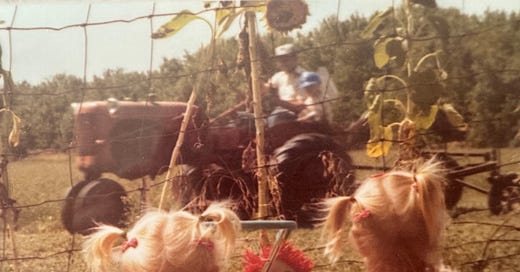“Half Measures availed us nothing. We stood at the turning point. We asked His protection and care with complete abandon.”1
–The Big Book of Alcoholics AnonymousBravely On The Way: How It Works
My friend, Rachel, says that finding The Way is like holding onto a little baby bird: you gotta have a light touch, but if you don’t take care to squeeze in a bit, you never even had a chance. Growing up on a farm, spring kitty litters were more my training ground. Like clockwork every May, sis and I would sneak our way up into dusty sunbeams and, with rapt attention worthy of any world-class symphony, listen attentively for muted mews behind square bales. It was sacred ritual. Intuitively, we understood the stealth, steady moves required as the price of entry. But if we made enough trips up that rackety ladder, enough straw pokes into summer legs, enough hushed whispers alongside painstaking patience—inevitably, the path would give way to a glory of whiskers, worried brows, and freshly padded paws.
This work of welcoming new life—young, creaturely growth—comes with an economy all its own. The rules are different. It’s less about information or speed or scale and more about listening and patience and surrender—whole-body climbs up onto rickety hayloft ladders, precariously perched inside of the old barn.
Weeks ago, I’d scribbled down a quote—sticky words asking for another round of attention:
The process is easy to understand, but will require real effort and possibly some significant changes on your part. You’ll need emotional courage—a willingness to be fiercely real with yourself, call your sin what it is, and relentlessly fight your dragons. It is quite a painful thing to dig deep into your motives and find that damaged roots exist. It’s no fun to admit your anger, your pride, your selfishness or greed, and then have to wrestle those emotions into submission before you make a move. But this is critical for gaining the “ears to hear” that Jesus so often spoke of.2
—Terry Looper, Sacred PacePerusing the words again, I feel my allergic reaction to the religious jargon. Yet some part of me ponders this breathtaking range: Kitties in the hayloft. Dragons. Sin. Damaged roots.
I want to push back—to protest—but somewhere in my deepest self, I know that The Way is bound up with my own messy work of becoming. The weight-bearing steps, these whole body climbs, ask for new and different ways of being. And maybe, probably, the only way to get there involves a lot of dusty, pokey prodding.
In his recent book on the Twelve Steps, in a section entitled “Half Measures”, John Ortberg describes our resistance to surrender: “We naturally resist this. We would prefer to navigate between what our conscience demands and what our desires crave, while remaining in control of our lives…[but] half measures don’t work because this step involves the basic orientation of our soul, and this cannot be divided into parts. No one can be a little bit pregnant or a little bit married…It is that way with surrender.” (Italics mine.)
Ortberg invites us to physically experience willfulness and willingness…
“First, make both hands into a fist. Squeeze hard. Feel the tension that grips not only your fingers, but also your forearms and biceps, moving up into your shoulders and even into your neck. Notice how exhausting it would be to retain this pose for minutes...or hours...or years. We can call this posture willfulness. It is marked by the determination that my will should prevail. I must have what I desire. I must avoid what I dread. This is a reflex we’re born with; just put your finger in a baby’s hand and it will clutch.
Now...let go. Let your fingers relax. Open your hands and let them lie on your lap, palms up toward the sky. Feel the relief that brings to the muscles in your arms. This is not exhausting. Notice the slight sense of openness, even vulnerability, that enters both body and mind. Notice, too, the slight sense of anticipation, as though you are ready to welcome something good into your hands. This posture expresses willingness. In this posture we no longer demand to be in control.
Willingness is always available.
Willingness is never exhausting. It refreshes the soul.”3
Questions for Reflection:
The baby bird, the barn kittens, the rickety climb toward hidden life—all of it speaks to the nature of transformation. What parts of your life feel like a hayloft search: messy, pokey, uncertain—yet sacred?
Where are you being invited to hold on with a lighter touch? Is anything in your life—or anyone—nudging you toward “willingness”?
How do you typically respond to the discomfort of self-examination—do you resist it, rush through it, lean in? Are there any shifts you’d like to make here?
What’s a simple step you might take this week to embrace the messy, weight-bearing work of becoming? What’s the thing you need to know + name today?
Several weeks ago, I invited you to join me on a Lenten journey. Here are the earlier posts, in case you missed them:
Blurt It Out: A Lenten Invitation
Bravely On The Way: A Chorus of Questions
Bravely on The Way: When We Don't Know The Way
Are these thoughts helpful? Clicking the heart below helps others find me!
Feedback for next time?! You can share anonymously—via text or voice memo—by clicking below:
(Psst! I love when our broader community has the chance to engage with your questions & ideas, so comment on Substack when it works. If more private feedback seems best, do mention your name when it makes sense, so we can connect more personally, as I’m able.)
Chapter Five, The Big Book of Alcoholics Anonymous, A.A. World Services, Inc.
Sacred Pace, Looper, (Thomas Nelson)
Steps, John Ortberg, (Tyndale House)






jt - your insights are sublimely invitational. makes me want to follow you up the rickety ladder despite my reflexive resistance of surrender . .